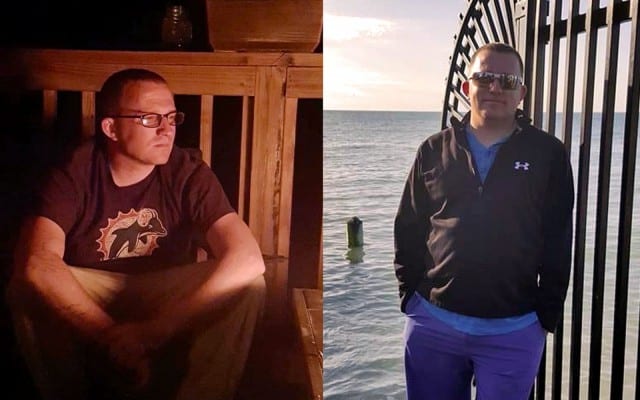Then-Staff Sgt. Scott Schmidt tried to explain his sudden struggle with crippling depression, anxiety and paranoia as he sat opposite his behavioral health counselor at Camp Arifjan, Kuwait.
As a hard-charging telecommunications operations chief with the 518th Tactical Installation and Networking Company, Schmidt displayed no signs of mental distress before his deployment from Fort Gordon, Georgia, in May 2016.
Schmidt’s behavior rapidly changed more than two months later, as he started showing up late for physical fitness training and work, prompting his chain of command to get involved.
He couldn’t explain the constant bouts of fear he experienced while traveling around the installation — feelings that he would dismiss during regular phone conversations with his wife. Schmidt also struggled to understand why he would break down in tears without any reason, or the rationale behind a facial tic he developed whenever asked about his mental state.
“I honestly, for the life of me, could not figure out what was wrong with me,” said Schmidt, now a sergeant first class, during a recent interview.
Unknown to him at that time, Schmidt’s selective memory loss and emotional and physical response to trauma all started just weeks prior, when two unidentified men sexually assaulted him, he said.
It would take months before Schmidt could articulate what happened, seek proper support, and start to move on from the experience. Now, he shares his story to help with his recovery process and motivate others to speak up.
Regret, fear

Camp Arifjan had two distinct lodging areas. There were temporary barracks facilities, where members of the 518th TIN Co. stayed, across from long rows of Conex individual living areas frequently utilized by permanent personnel, he said.
During the evening of the incident, Schmidt recalled being outside and enjoying a cigar when he noticed a small group of people watching TV at another designated smoking area. Curious, he elected to walk over and see what was going on.
As Schmidt cut through the rows of Conex quarters, he walked past a man in civilian clothes sitting on the front stairs of his room, he said.
“I didn’t know if he was military, a contractor, or a government civilian,” Schmidt added. “He asked me if I had a lighter that he could borrow, so I said, ‘Yes, I do.'”
The man stood up and quickly ran inside, declaring that he needed to grab his cigarettes. Schmidt reached into his pocket to retrieve his lighter and felt no perceived threat as he moved closer to the door to wait for his return.
“About that exact moment, I felt somebody push me from behind,” Schmidt said. “The push gave me enough momentum that I was going to either fall on the stairs or enter his room.
“As I turned around to say something, a different guy was shutting the door behind me,” Schmidt added. “In his hand, he had a big Ka-bar knife –- the one with a serrated edge on one side and a sharp blade on the other. He told me to shut up.”
Scared for his own life and thinking about his wife and four kids back home, Schmidt stood silent as the first guy walked behind him and started rubbing his shoulders before escalating his behavior.
“As I started to resist, the guy in front of me slammed his knife down hard on a dresser and said, ‘I told you not to say anything — don’t do it again,'” Schmidt recalled. “All I could think is that I didn’t want to be found buried back in the desert, because I didn’t listen to what they said.”
The two offenders took turns sexually assaulting Schmidt while they held him at knifepoint.
When the assault was over, “one of the guys stood up and said, ‘That was fun, we should do it again,'” Schmidt said with anger in his voice. “It was as if we planned and met somewhere and decided to do this thing together.
“Every day I remember this, and it still bothers the hell out of me,” he added.
One of the offenders then gave Schmidt a look as if to say, “we are done — what are you still doing here?” Schmidt ran out of the room, and for the next couple of hours, he weaved through bathrooms and around buildings to avoid being followed.
“I remember wanting to take a shower,” Schmidt said. “Previous to this incident, I was certified as a Sexual Harassment/Assault Response and Prevention program victim’s advocate. I did the exact thing that the SHARP program tells you to avoid.”
It was around this time that Schmidt’s memory started to fade, he added.
“I felt ashamed and embarrassed. I remember thinking that there was no way this should have happened,” he said. “That is when I decided it did not happen to me. I was going to ignore it, and I was never going to talk about it again.”

Road to recovery
Depression quickly set in as Schmidt started to sleep past his alarms, which impacted his work performance and professionalism, he said. Until that point, he was never the type that would show up late for PT or work, but bouts of sadness made him want to sleep throughout the day.
The feeling of anxiety and panic attacks happened shortly after, he added.
“I found when I was in the dining facility, if I wasn’t sitting in a corner away from everybody or if people were walking behind me to get more food, I was paranoid,” he said.
Schmidt’s emotional well-being continued to spiral downward as he started to receive behavioral health support. He ultimately transitioned into a permanent support program where he attended group sessions and classes.
“I did that for a while and still couldn’t shake it, or give an answer to my problem. Shortly after I returned to duty, I got the call to take my team on a mission in Iraq,” he said.
“I went into my first sergeant’s office, in tears, and said, ‘I can’t take these Soldiers out there by myself,'” Schmidt added. “I am not combat arms, and people get hurt or die when they go with a leader who is not prepared and won’t admit it.”
After some deliberation, Schmidt’s chain of command had no choice but to send him back home to Fort Gordon. His wife, Betty, was there when he arrived and immediately took him to behavioral health to schedule his next appointment.
Schmidt’s condition continued to regress as he started to experience full-on blackouts and would lose blocks of time throughout the day.
“I was scared that I was going to hurt somebody and find out later that it was me,” Schmidt said.
Then like a camera coming into focus, Schmidt started to remember the events from that night.
“It hit me all in one day — I was home by myself and I just lost it,” he said of when his memory loss began to lift.
Apprehensive to tell anyone about his sexual assault, Schmidt started researching on his own and quickly found a lack of resources for male survivors.
“This is one of the reasons that I like telling my story,” he said. “There were a lot of resources for women and children, but not a lot for grown men wanting to come together and talk.”
Schmidt’s wife eventually stumbled across his research after discovering an open web browser window about sexual assault on his computer. She called him at work immediately, and he broke down and told her everything.
As he continued to share his trauma with his wife, Schmidt started to feel better and his work performance improved, he said. Things were moving in a positive direction up until the day he suffered another panic attack at work.
“We were completing inventories or something one day, when I had to take Soldiers behind some Conex boxes to get some work done. I remember that feeling of panic as if something was going to happen to me,” Schmidt said of how it triggered memories of the incident.
“I called my wife and said, ‘I think it is time that I tell somebody. I can’t do this anymore.'”
Getting support
Nearly two months after the incident, Schmidt called his chain of command and requested a meeting. Joined by his wife, he sat before his commander and first sergeant and explained everything that had happened.
“As soon as I told both of them, it was like a lightbulb turned on,” Schmidt said. “Everything I had done and my behavior since I got back from Kuwait made sense.”
Joined by his first sergeant, Schmidt visited the unit’s sexual assault response coordinator and started an unrestricted report. The SARC coordinated appointments with the Army criminal investigation division, while Schmidt continued to receive behavioral health services.
“It was overwhelming,” he said. “Once a report comes out, everybody wants to talk to you and ask questions.
“I knew it was getting to me and eating me up inside,” Schmidt added, as he explained his decision to file a report. “I felt it would relieve me of all that I was dealing with, so that people could understand what was going on with me.”
After filing his report, Fort Gordon CID coordinated with the Camp Arifjan office to identify Schmidt’s two offenders. Once they compiled a list of suspects, Schmidt returned to the office to review a series of mugshot photos, but he struggled to identify any suspects.
“I don’t believe that they ever found the people who did this, which is a shame. Every day, I hope that nothing happened to someone else,” Schmidt said.
Schmidt regrets not stepping up to share aspects of his sexual assault soon after it occurred, he said. If he could take it back, he said he would have walked into his commander’s office, told them what happened, and then escorted the military police to the offender’s door.
With 15 years of service, Schmidt is now a member of the executive communications team supporting the Army’s senior leaders at the Pentagon. He is slated to be promoted to master sergeant later this year.
“When I tell people my story, the first thing I say is ‘I’m going to give everyone some SHARP knowledge, not SHARP training,'” Schmidt said. “Every Soldier hates to walk into an auditorium and know they are about to spend 45 minutes flipping through slides.”
He added all leaders need to be engaged and take an active role during the SHARP training process. That is the only way the Army can move past a “death by PowerPoint” scenario to engage with Soldiers at all levels, he said.
“As a leader, you have to take everything seriously,” Schmidt said. “Soldiers understand that the Army has a mission to accomplish, but they also need to feel like they are an important part of the team.”
Moreover, leaders need to remain open and willing to support their troops. Suppose a leader says they have a zero-tolerance policy toward sexual harassment/assault, but won’t listen to a Soldier when they have financial or family issues, he added. In that case, they miss an opportunity to instill trust and support throughout their unit.
“You have to be concerned about everything, and you have to show your Soldiers that you care about them,” Schmidt said. “Soldiers need to know that they are not just a number within the Army.”
(If you are a victim of sexual assault, you should contact a SARC or victims advocate, seek medical attention or behavioral health support, or report the crime through the Army Criminal Investigation Command. Survivors can also call the DOD Safe Helpline at 877-995-5247 to receive secure, confidential, and anonymous crisis support services designed for DOD personnel.)
-By Devon L. Suits, Army News Service





